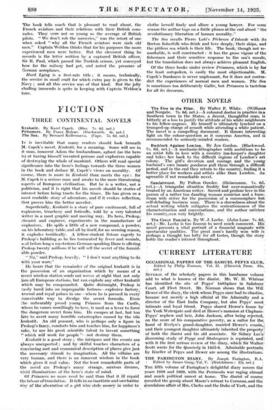FICTION
THREE CONTINENTAL NOVELS
IT is inevitable that many readers should look beneath M. Capek's novel, Krakatit, for a meaning. Some will see in it man, innocent Adam the husbandman, aghast (as the hero is) at having himself invented poisons and explosives capable of destroying the whole of -mankind. Others will read special significance into the hero's feelings towards the three women in the book and deduce M. Capek's views on morality. Of course, there is more in Krakatit than meets the eye : for M. Capek is a serious man and awake to the more threatening aspects of European civilization. But he is a writer, not a politician, and it is right that his novels should be stories of interest before being tracts for the times. He has given us a most readable story of adventure, and if it evokes reflection, that proves him the better novelist.
Superficially, Krakatit is a story of pure excitement, full of explosions, treachery and fisticuffs, told by a very talented Writer in a most graphic and moving way. Its hero, Prokop; chemist and engineer, experiments in the manufacture of explosives. He spills a little of a new compound, a powder, on his laboratory table,and all by itself, for no seeming reason,- it explodes terrifically. A fellow-student listens eagerly to Prokop's babbling as he lies tormented by fever and wounds, aad before long a mysterious German-speaking Dane is offering Prokop twenty millions if he will sell the secret of the formid- able powder.
"No," said Prokop, heavily. "I don't want anything to do. with your wars."
. He hears that the remainder of the original krakatit is in the possession of an organization which by Means of a' secret wireless station sends out waves at night that not only lam all European stations, but can explode any other krakatit Which may be compounded. Quite distraught, Prokop is' easily lured into an impregnable fortress—explosive -factory,' arsenal and royal palace in one—where he is pressed in every' Conceivable way to divulge the secret formula. Even' the unbearably proud young Princess from the Castle,' Whom he comes unwillingly to love, is used as a lever to force the dangerous secret from him. He escapes at last, but too' late to avert many horrible catastrophes caused by the vile krakatit. An old peasant, who is 'perhaps Only a figure in Prokop's fancy, comforts him and teaches'him, for happiness's- Sake, to use his great scientific talent to invent something "which will work for people "—not destroy them.
Krakatit is a good story ; the intrigues and the events are always unexpected; and by skilful toilettes characters of a Convincing sort and economical description of places give just
the necessary stimuli to imagination. All the villains are Very human, and there is an innocent wisdom in the book which gives it real value. Not the least remarkable parts of the novel ave Prokop's many strange, anxious dreams, vivid illuminations of the hero's state Of mind.- Of Prisoners no more need be said than that it ill repaid the labour Of translation. It tells in an inartistic and saceliatine
.3
way Of the- aberratiorr of a- girl *ha -stole aionCy. in order to -
clothe herself finely and allure a young lawyer. For some reason the author tags on a futile phrase at the end about "the revolutionary liberation of human morality."
The Sea recalls Pierre Lotrs P&heurs d'Iskinde -with its Breton flsherfolk who drink and love deeply, their ships, and the pitiless sea which is their life. The book;-though not re- markable, is Well constructed : it has the gross vigour of the fishermen and their sensitive response to the sea' S moods, but the translation' doesnot always achieve pleasant English. Of the three books nader. review Prisciners, Which is by far the least outspoken, is easily the most objectionable. M. Capek's frankness is never unpleasant, for it does not contra- dict the experiences of normal men and women. The Sea is sometimes too deliberately Gallic, but Prisoners is tasteless fer all its decorum.


























































 Previous page
Previous page